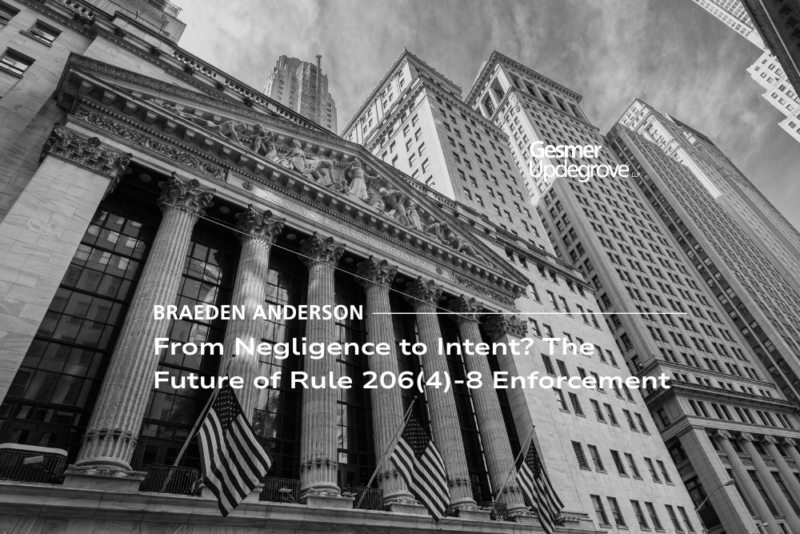
By Ibrahim Salah and Braeden Anderson
I. Introduction
In Handal v. Innovative Industrial Properties, Inc., No. 24-cv-28289, 2025 U.S. App. LEXIS 26763, 2025 WL 2922871, (3d Cir. Oct. 15, 2025), the United States Court of Appeals for the Third Circuit (the “Court”) reaffirmed what constitutes misleading statements actionable under Section 10(b) of the Securities Exchange Act of 1934 (Section 10(b)) and Rule 10b-5 promulgated thereunder.1
The case, arising from a cannabis real estate investment trust’s (“REIT”) alleged failure to uncover a tenant’s fraud, exemplifies that federal securities fraud liability requires deception, not mere negligence or mismanagement. The Court’s reasoning underscores that scienter, not hindsight criticism of corporate diligence, remains the sine qua non of securities fraud.
II. The Statutory Framework
Section 10(b) prohibits the use of any manipulative or deceptive device in violation of regulations promulgated by the Securities Exchange Commission.2 Rule 10b-5 prohibits making any untrue statement of a material fact or omitting to state a material fact necessary in order to make the statements made, in light of the circumstances under which they were made, misleading.3 The intent behind these prohibitions is to protect would-be investors who may be persuaded to invest upon reviewing statements made by the public company or its officers.
To state a claim under Section 10(b) and Rule 10b-5, a plaintiff must plead:
- A material misrepresentation or omission;
- Scienter, meaning intent to deceive, manipulate, or defraud, or, at minimum, severe recklessness;4
- A connection between the misstatement and the purchase or sale of a security;
- Reliance upon the misrepresentation or omission;
- Economic loss; and
- Loss causation, establishing that the misrepresentation proximately caused the loss.5
Courts construe these elements narrowly to avoid converting the securities laws into a general enforcement mechanism for corporate incompetence. The Supreme Court has held that Congress by Section 10(b) “did not seek to regulate transactions which constitute no more than internal corporate mismanagement.”6 This case reaffirms this legislative intent.
III. Factual and Procedural Background
Innovative Industrial Properties, Inc. (“Innovative”) is a publicly traded REIT specializing in the acquisition and leaseback of facilities operated by licensed cannabis companies under triple-net leases where the tenant is responsible during the lease term for repairs, taxes, and insurance. To finance capital improvements, Innovative sometimes enters into reimbursement arrangements contingent upon submission of draw requests and supporting documentation.
Kings Garden, Inc. (“Kings Garden”), a California-based cannabis cultivation enterprise, entered into such reimbursement agreements for two properties, one in San Bernardino and another in Palm Springs, totaling approximately $76.4 million. Between 2021 and 2022, Kings Garden submitted fraudulent draw requests supported by falsified invoices and inconsistent digital metadata. Innovative reimbursed more than $48 million before detecting irregularities in June 2022.
After an internal investigation that began in June of 2022 revealed that contractors had performed little or no work, and site inspections confirmed the falsity of Kings Garden’s submissions, Innovative discovered that its tenant had effectively misappropriated the funds. Kings Garden defaulted on $2.2 million in rent, prompting Innovative to initiate a state-court fraud action in California.
Subsequently, shareholders filed a putative federal class action alleging that Innovative’s public filings and statements misrepresented the company’s due diligence, oversight, and verification practices, thereby violating Section 10(b) and Rule 10b-5.
IV. The Challenged Statements
The plaintiffs identified five categories of allegedly misleading statements:
- Factual Statements About Tenant Due Diligence and Monitoring
- Opinion Statements of Praise for Kings Garden
- Factual Statements Concerning Innovative’s Reimbursements; and
- Form 8-K Statement About King Garden’s Rent Default
They argued that these statements were materially false or misleading because Innovative failed to detect Kings Garden’s fraudulent activity and failed to disclose internal weaknesses in oversight.
Contact Us Today:
V. The Third Circuit’s Decision
The Third Circuit affirmed dismissal of the complaint, concluding that the plaintiffs failed to plead falsity or scienter with the particularity required under the Private Securities Litigation Reform Act of 1995 (PSLRA).7 The Court noted that “the falsity inquiry must focus on whether each individual statement the plaintiff has identified was, as written or spoken and at the time the statement was made, actually false or misleading by omission.”
A. Factual Statements About Tenant Due Diligence and Monitoring
Innovative’s filings disclosed that it “typically performs diligence” and “in some instances conducts site visits.” Those filings also disclosed that for due diligence it relies on its management team. Plaintiffs alleged that Innovative’s securities filings affirmatively stated that Innovative did not purchase properties until its management team conducted satisfactory completion of due diligence investigations. The Court found those allegations to be untrue: Innovative did not affirmatively warrant that all of its purchases followed satisfactory completion of due diligence investigations. Innovative never promised that its diligence would meet any particular standard of thoroughness but instead Innovative represented that it relied on management. The Court explained that “[e]ven if Innovative missed obvious red flags,” that fact “cannot sustain a securities claim.”
With respect to representations about ongoing evaluation and monitoring, Innovative represented that it reviews “publicly filed financial reports, press releases, and other publicly available industry information” concerning tenants and guarantors, and that Innovative “in some instances” conducts “site visits and meet[s] with [its] tenants to discuss their operations.” Plaintiffs argued that these representations are actionable because Innovative failed to scrutinize draw requests that were fraudulent on their face and otherwise failed to detect that Kings Garden had not obtained the work Innovative reimbursed.
Plaintiffs clung to the fact that Innovative did not conduct site visits of the Palm Springs or San Bernardino sites until after a suspicious draw request. However, since there were no allegations that the Kings Garden’s draw requests were discussed in publicly filed financial reports and press releases, the representations about what Innovative reviews were not false. As to site visits, the Court noted the disclaimer offered by Innovative: in some instances, Innovative performs sites visits. “Innovative did not make a blanket promise” to conduct site visits of all tenants.
B. Opinion Statements of Praise for Kings Garden
Prior to discovering Kings Garden’s fraud, Innovative (through its CFO and V.P. of Investments) praised Kings Garden and its principals during periodic earnings calls. The praises were as to its commercial reputation and business developments, practice of issuing dividends to its owners, and commercial relationship with Innovative. Under the Supreme Court case of Omnicare, Inc. v. Laborers District Council Construction Industry Pension Fund, liability for an opinion statement exists where: 1) the speaker does not believe what they say, 2) embedded in the opinion statement are untrue factual assertions, or 3) the speaker omits material facts about its inquiry into or knowledge of the facts underlying the opinion and those facts conflict with what a reasonable investor would take from the statement itself. 575 U.S. 175, 188-189 (2015).
Because the Plaintiffs did not allege that the statements were insincere or embedded with false factual assertions, the Court analyzed the statements under the third scenario. Under that scenario, the Court noted that “Omnicare permits liability only when the speaker knew there was something to inquire about in the first place.” Plaintiffs argued that because these statements occurred at a time that Innovative was subjected to at least one fraudulent draw request and had access to some of Kings Garden’s financial statements showing millions missing from Kings Garden’s accounts, the statements of praise were misleading under the law. However, the Court held that because the CFO and the V.P. were (at the time of the statements) unaware of the information that allegedly undercut their opinions and had not suspected that Innovative was being defrauded, the statements were not misleading.
C. Factual Statements Concerning Innovative’s Reimbursements
Before discovering the fraud, a report was released by an Innovative short-seller. The report criticized certain Innovative tenants, argued that its stock was overvalued and detailed the unearthing by the short-seller of multiple lawsuits alleging Kings Garden had committed fraud in connection with its own business. The report however did not comment on Innovative’s reimbursement arrangement with Kings Garden. The report did however allege another tenant had received suspicious reimbursements and spoke to lawsuit allegations surrounding falsification of books and records for personal gain by Kings Garden’s co-founder.
Innovative responded to the report the same day in a public statement alleging that the short-seller did not understand the process that Innovative employs for underwriting tenant improvements and “any [Innovative] reimbursements relate only to verified, qualified improvements to the buildings for [infrastructure improvements], and never as funding for any type of loan to be utilized for any other purpose.”
Although it did not yet know it, Innovative had in fact made reimbursements that were unqualified and unverified, so this representation was false. Yet, the Court stressed that falsity alone is insufficient to establish liability under Section 10(b) since scienter must be established. There was no sufficient showing of an intent to deceive or severe recklessness.
The Plaintiffs did not allege that as of the date of this representation anyone at Innovative knew or suspected that it was being defrauded. Any “should have known” argument can be the basis for a state negligence or breach of fiduciary duty claim, but not for securities fraud the Court relayed. The Court agreed with its sister circuits’ adoption of the principal that an egregious refusal to see the obvious or investigate the doubtful can support a strong inference of scienter.
However, here, the Court held, that is not strongly inferable even though it had in its possession the short-seller’s report. Even if Innovative should have, upon receiving the report, begun an investigation and held off on publicly responding to the report until it could come to some conclusions about Kings Garden, the statements made were not actionable given the lack of scienter.
D. Form 8-K Statement About King Garden’s Rent Default
After beginning to suspect fraud, Innovative disclosed in a Form 8-K that Kings Garden failed to pay rent in July 2022. The Court held that despite the Plaintiffs argument, a reasonable investor would not have expected Innovative to disclose the results of its then-unfinished investigation of King Garden’s fraudulent reimbursements.
Form 8-K is a mandatory filing that publicly traded companies must submit to the Securities and Exchange Commission (SEC) to announce significant or “material” events that shareholders are required to know. Unlike mandated periodic reports such as annual (Form 10-K) or quarterly (Form 10-Q) filings, Form 8-K is designed to reveal essential matters in time for shareholders to react. Matters that must be reported on the form include acquisitions, bankruptcy, directors’ resignations, or fiscal year changes.
The Court held that the Form 8-K was not misleading by omission since the sole subject of disclosure was Kings Garden’s failure to pay rent. There was no affirmative duty to disclose the ongoing investigation since Oran v. Stafford, 226 F.3d 275 (3d Cir. 2000) held that the three circumstances in which a duty to disclose may arise include insider trading, a statute requiring disclosure, or a prior disclosure that was inaccurate, incomplete or misleading. 226 F.3d at 285-86. None of these situations applied.
VI. Doctrinal and Practical Implications
The Third Circuit’s opinion underscores three enduring principles that collectively delineate the scope of securities-fraud liability:
- Scienter as the Doctrinal Boundary.
Negligence, poor diligence, or even gross oversight failures fall short of the scienter requirement.8 Intentional or reckless deception remains the touchstone. - Temporal Precision in Evaluating Disclosures.
The truth or falsity of a statement is assessed at the time it was made; later-discovered misconduct by counterparties cannot retroactively render earlier statements misleading.9 - Protection for Opinion and Optimism.
Corporate expressions of confidence or optimism, particularly those couched in general or aspirational terms, are presumptively nonactionable.10
For REITs and other public issuers operating in emerging or high-risk markets, Handal reinforces the importance of careful linguistic calibration in disclosures. Qualifying language such as “typically,” “in most cases,” or “based on information available at the time” may substantively reduce exposure while maintaining transparency.
Moreover, maintaining contemporaneous records of due diligence and monitoring efforts can be decisive in demonstrating good faith and can be used during litigation as a way to try and combat any inference of scienter.
VII. Conclusion
The Third Circuit’s ruling in Handal v. Innovative Industrial Properties serves as a clarion reaffirmation that Section 10(b) and Rule 10b-5 target deception, not imperfection. The securities laws were never intended to punish mistaken judgment or operational missteps but to deter deliberate dishonesty in the marketplace.
While Innovative ultimately prevailed, the case underscores that even where legal liability is absent, reputational consequences and shareholder scrutiny often follow perceived diligence failures. In an environment where the boundary between compliance and omniscience is increasingly blurred, issuers are best served by combining precise disclosure drafting, robust verification protocols, and documented good faith. This should be done not as a shield against fraud, but as evidence of due diligence which is paramount to this business.
Footnotes
- Securities Exchange Act of 1934 § Section 10(b), 15 U.S.C. § 78j(b).
- 15 U.S.C. § 78j(b).
- 17 C.F.R. § 240.10b-5.
- Owens v. Jastrow, 789 F.3d 529, 536 (5th Cir. 2015).
- Dura Pharms., Inc. v. Broudo, 544 U.S. 336, 341–42 (2005).
- Santa Fe Industries, Inc. v. Green, 430 U.S. 462, 484 (1977).
- Private Securities Litigation Reform Act of 1995, Pub. L. No. 104-67, 109 Stat. 737.
- Ernst & Ernst, 425 U.S. 185, 193 (1976).
- In re NAHC, Inc. Sec. Litig., 306 F.3d 1314, 1330 (3d Cir. 2002).
- Omnicare, 575 U.S. at 184.
Meet The Authors
Check Out Our Latest Publications:
- The Third Circuit Reaffirms Section 10(b) and Rule 10b-5’s Standards for Misleading Statements and Scienter
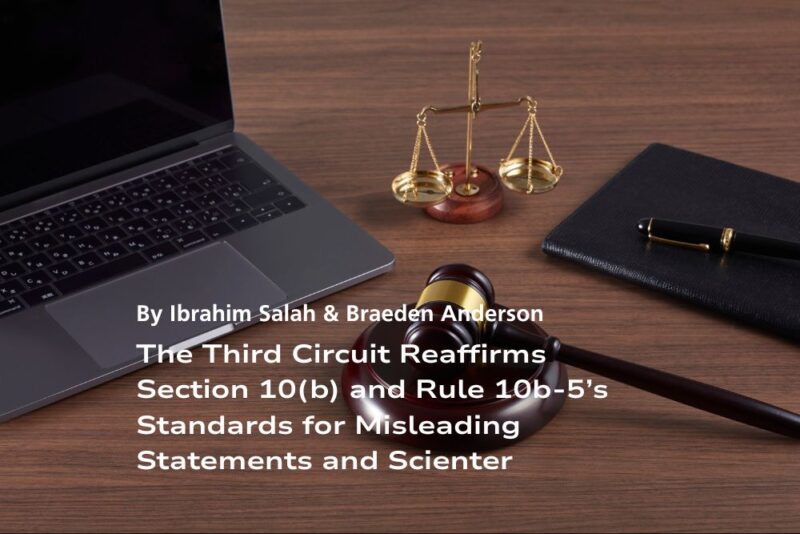
- SEC Chairman Paul Atkins Announces Updates to Wells Process
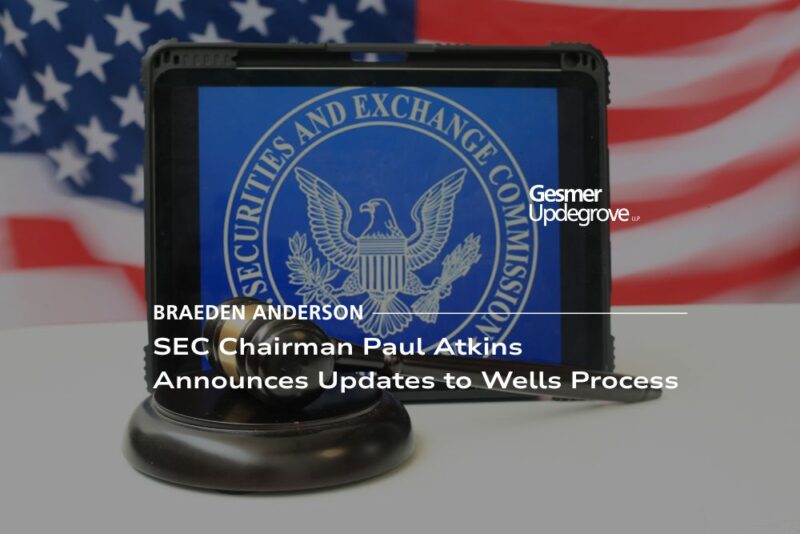
- SEC Policy Update: Coordinated Review of Settlements and Waivers Restored
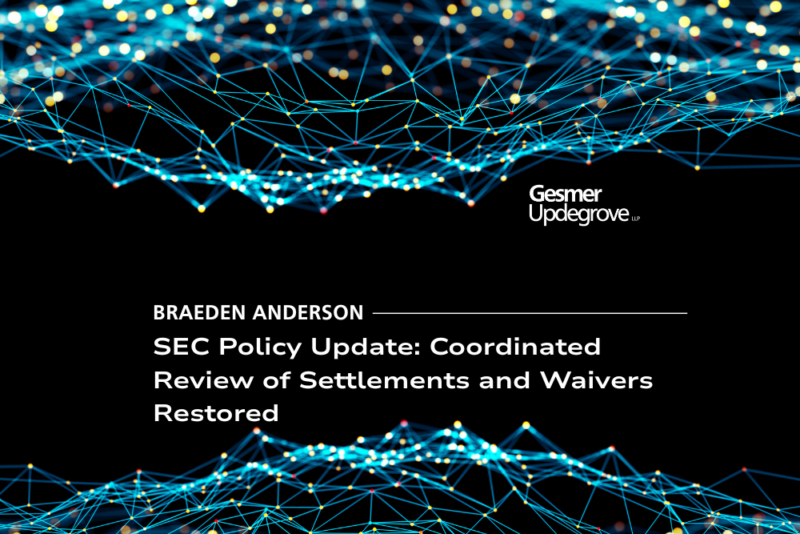
- SEC Provides Key Update on Treasury Clearing Rule Implementation

- Coordinated Clarity: SEC and CFTC Issue Joint Statement on Spot Crypto Asset Trading
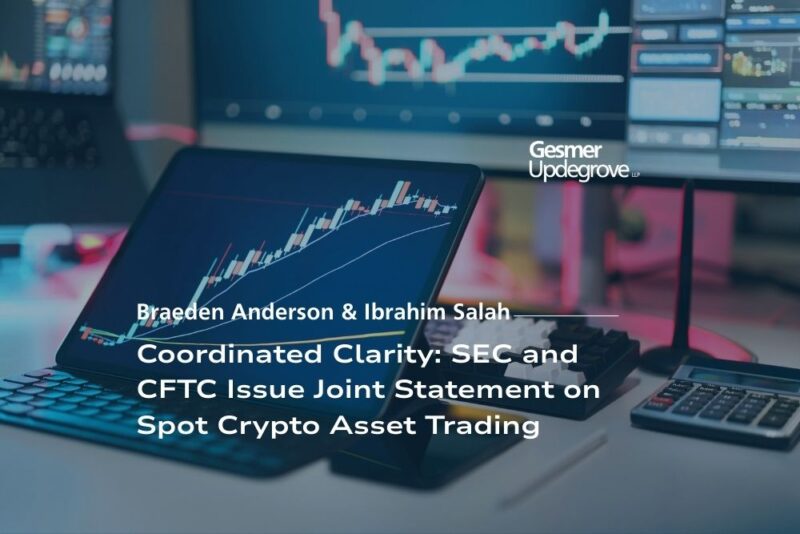
- From Negligence to Intent? The Future of Rule 206(4)-8 Enforcement
